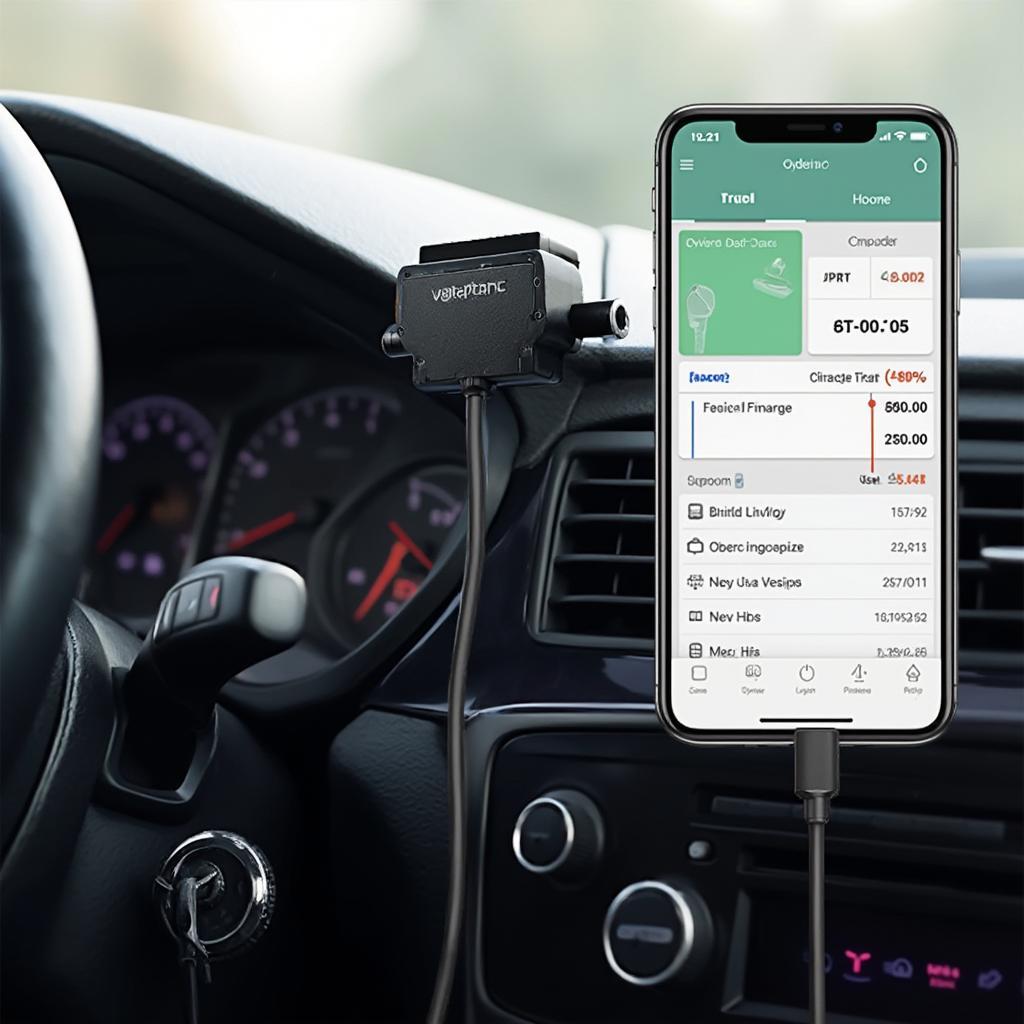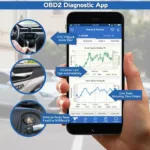OBD2 wireless adapters are revolutionizing how we interact with our vehicles. These small devices unlock a treasure trove of information about your car’s performance, health, and even fuel efficiency. Whether you’re a seasoned mechanic or a curious car owner, an OBD2 wireless adapter empowers you to take control of your car’s maintenance and diagnose issues before they become major headaches. Read on to explore the world of OBD2 wireless adapters and discover how they can transform your driving experience.
obd2 scanner bluetooth wifi adapter
What is an OBD2 Wireless Adapter?
An OBD2 wireless adapter, often called a “dongle,” plugs into your car’s OBD2 port (usually located under the steering wheel) and communicates wirelessly with your smartphone, tablet, or laptop. It acts as a bridge, translating complex data from your car’s computer into an easily understandable format. This allows you to monitor various parameters in real-time, from engine RPM and coolant temperature to fuel consumption and emissions.
Why Choose an OBD2 Wireless Adapter?
Imagine having a personal mechanic in your pocket. An OBD2 wireless adapter grants you this power, enabling you to:
- Diagnose Check Engine Light: Quickly identify the cause of that dreaded check engine light without rushing to a mechanic.
- Monitor Vehicle Performance: Track vital statistics like speed, RPM, and fuel consumption to optimize your driving habits and improve fuel efficiency.
- Clear Trouble Codes: After fixing a problem, clear the trouble codes yourself, saving you a trip to the garage.
- Customize Your Car’s Settings: Some advanced adapters even allow you to tweak certain settings, unlocking hidden features within your vehicle’s computer.
- Track Maintenance: Keep a log of maintenance tasks, such as oil changes and tire rotations, ensuring your car stays in top condition.
Types of OBD2 Wireless Adapters
There are several types of OBD2 wireless adapters, each with its own pros and cons:
-
Bluetooth OBD2 Adapters: These adapters offer a stable connection and work well with most smartphones and tablets. They are generally more affordable than Wi-Fi adapters.
-
Wi-Fi OBD2 Adapters: Wi-Fi adapters often provide a faster data transfer rate than Bluetooth, making them ideal for monitoring data-intensive parameters. They can create their own Wi-Fi network or connect to your existing car’s Wi-Fi.
obd obd2 key adapter bluetooth
How to Choose the Right OBD2 Wireless Adapter
With so many options on the market, choosing the right OBD2 wireless adapter can seem daunting. Consider these factors:
- Compatibility: Ensure the adapter is compatible with your vehicle’s make, model, and year. Check for compatibility lists provided by the manufacturer.
- Features: Determine what features are important to you. Do you need basic diagnostics or more advanced functionalities like data logging and customization?
- Software Compatibility: Make sure the adapter works with the diagnostic software or app you intend to use. Read reviews and check compatibility charts before purchasing.
- Budget: OBD2 wireless adapters range in price, so set a budget and stick to it. Don’t be swayed by unnecessary features if you’re on a tight budget.
What Does the Future Hold for OBD2 Wireless Adapters?
As cars become increasingly connected, OBD2 wireless adapters are poised to play an even larger role in vehicle diagnostics and maintenance. We can expect to see more sophisticated features, such as predictive maintenance alerts and integration with smart home systems.
Unlocking Your Car’s Potential with OBD2 Wireless Adapters
“An OBD2 wireless adapter is an essential tool for any car owner who wants to stay informed about their vehicle’s health and performance,” says automotive expert, Dr. Emily Carter, PhD in Mechanical Engineering. “It’s like having a window into your car’s soul.” Investing in an obd2 wireless adapter is a small price to pay for the peace of mind and control it provides.
obd2 wireless bluetooth adapter
Conclusion: Empower Yourself with an OBD2 Wireless Adapter
An OBD2 wireless adapter is no longer a luxury but a necessity for every car owner. From diagnosing pesky check engine lights to monitoring crucial performance data, these small yet powerful devices put you in the driver’s seat when it comes to your car’s maintenance. Embrace the future of car care and unlock the hidden potential of your vehicle with an obd2 wireless adapter.
bluetooth obd2 scanner adapter
“Regularly using an OBD2 wireless adapter allows you to identify potential issues early on, preventing costly repairs down the road,” adds Dr. Carter. “It’s a proactive approach to car maintenance that empowers drivers to take control.”
FAQ
- Are OBD2 wireless adapters universal? Most OBD2 adapters work with vehicles manufactured after 1996 in the US, and 2001 in Europe and other regions. Always check for compatibility before purchasing.
- Can I install an OBD2 wireless adapter myself? Yes, installation is incredibly simple. Just locate your car’s OBD2 port and plug in the adapter.
- What is the difference between Bluetooth and Wi-Fi OBD2 adapters? Bluetooth offers a stable connection and lower cost, while Wi-Fi provides faster data transfer rates.
- Do I need special software to use an OBD2 wireless adapter? Yes, you’ll need a compatible app or software, many of which are available for free or a small fee.
- Can I leave the OBD2 wireless adapter plugged in all the time? Generally, yes, but it’s recommended to unplug it when not in use to prevent battery drain.
- How often should I use my OBD2 wireless adapter? It’s a good idea to check your car’s data periodically, especially if you notice any unusual performance issues.
- Where can I find reputable OBD2 wireless adapters? Check online retailers and automotive stores for reputable brands with positive reviews.
If you need assistance, please contact us via WhatsApp: +1(641)206-8880, Email: [email protected] or visit us at 789 Elm Street, San Francisco, CA 94102, USA. We have a 24/7 customer support team.

